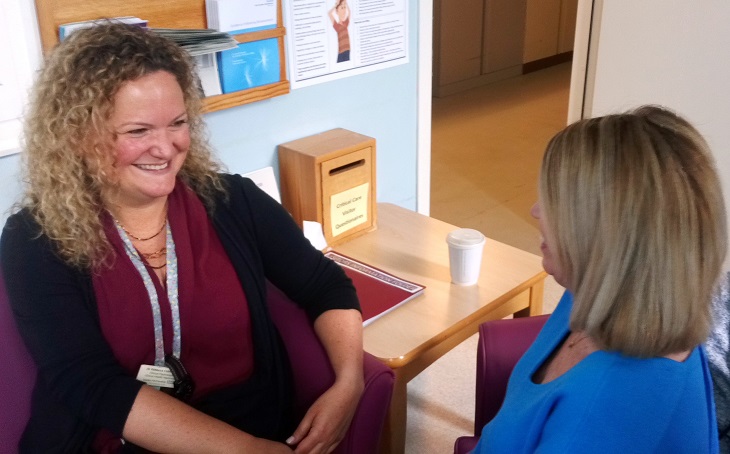The first Clinical Psychologist working in Critical Care for the South of England has been employed at the Trust to provide psychological care for patients on the Unit and after their stay.

Clinical Psychologist Dr Becky Coles-Gale talks to former patient June Billington
In 2012 the government published a paper, ‘No Health without Mental Health’ which highlighted the need for mental health services to have parity of esteem with physical health services. It championed early intervention, including family and carers in care and increasing access of evidence-based interventions. Dr Becky Coles-Gale, Clinical Psychologist, aspires to deliver this with patients in Critical Care and once they have left the unit as part of their overall recovery.
Dr Becky Coles-Gale, Clinical Psychologist said: “Patients in Critical Care have suffered a traumatic event and there is a fundamental need for their psychological care to be integrated alongside physical care. Evidence shows that after a stay in critical care, up to 40% of patients are vulnerable to developing the debilitating symptoms of anxiety and depression, and up to 30% can develop Post-Traumatic Stress Disorder (PTSD).”
“Having a psychologist in the service means that patients are seen in a timely appropriate manner as part of the service delivery rather than as an ‘add on’ several months later, when psychologically people may be seriously struggling because emotional problems have escalated. Being part of the staff team on the unit also means psychological support isn’t stigmatising – it’s part of our care for you. In ESHT the critical care psychologist is also available to work with the families, relatives and the critical care staff.”
“The literature also highlights how vulnerable critical care staff can be to developing symptoms of vicarious trauma and work-related burnout due to the intense nature of the work and the clinical environment. It is therefore so important that the Trust has made a point of employing me to help support the critical care staff in their clinical roles alongside the patients and families that they care for.”
